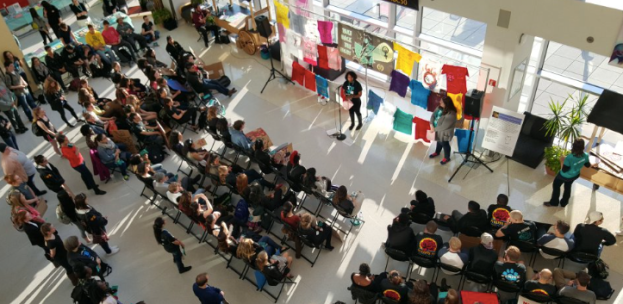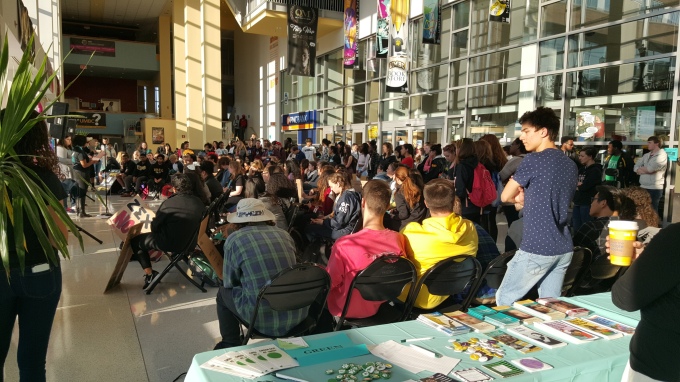What You Need To Need Know: Take Back The Night & the Survivor Speak-Out
April is Sexual Assault Awareness Month, and the Women’s Center is hosting its 5th consecutive Take Back The Night (TBTN) on Thursday, April 13th. Over the years, we’ve had a lot of questions about what Take Back the Night exactly is, why it looks the way it does, and how students can get involved. To help get those questions answered this year, we’ve doing a “What You Need to Know” series focused on TBTN so stay tuned for more posts over the next couple of weeks. This is the 2nd post in the series and it focuses on the survivor speak-out.

The survivor speak-out is the heart of Take Back the Night. This is the point in the night where survivors are encouraged to come up and share their story with the crowd before the march throughout campus. As a survivor, sharing your story at TBTN allows you to publicly acknowledge your experience with a crowd that believes you and supports you.
I, student staff member Kayla Smith, have started the speak out for the past two years and I cherish that moment as a time where I can share my experience with people who I know won’t judge me. I can look out into a crowd of people who won’t tell me its my fault, ask what I was wearing, ask if I was drinking, or tell me that I was responsible for my assault. Speaking out about my assault empowers me to talk about my experience with confidence.
There are a variety of stories and experiences that are shared during the speak- out. Some may share stories or healing while others are still angry, sad, or scared. All of our stories and experiences are valid. And, no matter where you are at in your experience as a survivor (i.e. your assault happened 10 years ago or just last week), you’re welcomed to share your story.

Women’s Center Student Staff Member Kayla Smith speaking to the crowd at TBTN 2016
If you’re thinking about speaking at Take Back the Night, feel free to reach out to Women’s Center staff ahead of time if you feel like it would be helpful to talk to someone ahead of time about your story and how you may want to share it. Of course, we know many survivors may not plan on speaking at TBTN and then feel called to do so once the speak-out begins and that’s okay!
It’s also totally okay if don’t feel ready to share your story at Take Back the Night – there’s many other ways you can share your story in less public ways throughout Sexual Assault Awareness Month (like making a t-shirt for the Clothesline Project or attending the Monument Quilt workshop) and Take Back the Night (counselors will be available throughout the event and there will be the self-care station). Survivors or anyone impacted by sexual violence can also always schedule a time to talk to Women’s Center staff – we’re quasi-confidential resources on campus and can link you to additional support and resources.
Here’s some helpful information about the speak-out we think is helpful for everyone to know whether they’re speaking or listening:
- Any one can be a survivor of sexual violence. Any survivor regardless of their gender identity or sexual orientation is welcomed to share their story at the speak-out.
- The survivor speak-out is intended to center the voices and experience of survivors of sexual violence. The speak-out is for allies to listen and survivors to break their silence. Thank you in advanced for respecting this request. Allies are also encouraged to attend the Women’s Center workshop on Supporting Survivors of Sexual Violence on 4/12.
- Since TBTN functions as a public forum, normal reporting procedures look a bit different. If you choose to share your story, and want to go no further in the reporting process, we encourage you not to disclose any names or other specific identifying information, such as locations or familial relationships, as those details may prompt staff to follow up with you for reporting matters. Staff are available at the event for those who do want additional resources and want to report their experience through UMBC’s Title IX reporting process or police.
- We ask that you try to limit your story to about 3 minutes. We know it may be hard to do so but we want to make sure as many survivors as possible can speak during the allotted speak out time which is one hour long.
- Speakers will have the option to identify their story as confidential by placing a sign marked “confidential” on the microphone. Speaking from the “confidential” microphone prohibits anyone from taking pictures, quotes, or recording of any kind.
- Counselors-On-Call will be available throughout the evening. Any one needing additional support or simply needs to take a break are invited to visit the self-care station that will be set up in the Commuter Lounge.

For more information about UMBC’s TBTN (check out Facebook, Instagram, and Twitter too by searching the hashtag #UMBCTBTN):
- Supporting Survivors of Sexual Violence Workshop information for faculty & staff and students.
- Speak: Knowing a Survivor Without Knowing Their Story – a blog post on cultivating a survivor-responsive campus.
- The Women’s Center 2016 TBTN roundup
- The Retriever Weekly photo gallery of TBTN
- Stop by the Women’s Center on April 11, 12, and 13th to make a rally sign for the march!
- Stop by the Clothesline Project on 4/6 on Main Street!
Stay tuned for the next installment of what you need to know about TBTN 2017!
Posted: April 3, 2017, 9:00 AM